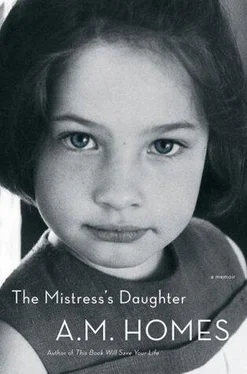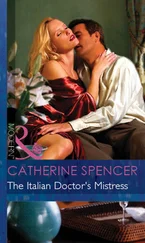“What did you expect?” a friend asks.
“More,” I say.
“This is nothing new,” she says. “He’s behaving in character. Look at what he did to your mother. He’s not a good guy.”
“He’s my father.”
“You’re screwed.”
I am waiting for this man to do the right thing. What I want from him is not his money or even his love — at this point, in the absence of his affection, I want a context, a history, a way of understanding how all this came to be. Will I ever have the question answered: Where did my paternal grandparents meet, what was their courtship like, how did it happen that the son of a Jewish butcher married a Southern belle?
And now I also have to defend my dead mother. My friend is right about this. It’s not about me, it’s about him, it’s about the way he behaves, how he values people, how he does only what he wants, what’s good for him. My mother had no life after she gave me up — she never married, never had another family. She had invested in him from a very early age — he used her and then said good-bye. She never recovered.
“Law is not about what is fair, you realize that,” a friend says to me.
I call another friend, who calls Lanny Davis, a well-known Maryland lawyer who acted as special counsel to the White House under Bill Clinton. I remember Davis from when I was growing up and he was an up-and-coming local politico. I instinctively trust him and explain the situation. Lanny offers to make a call for me; he is quite sure that if he explains the situation to my father — and the reason that I am asking for this document — it will be forthcoming.
“There’s no reason to think we’ll have to take this further.” I give him the telephone number and again mention that the wife might answer the phone. He calls me the next afternoon — shocked. My father took his call, seemed to know why he was calling before he even said anything, and flat out refused. Lanny, being careful about his description of the events, told him, “I was approached by your daughter and asked to consider representing her, but having heard the story, it is my hope that this can be resolved without my having to put my lawyer hat on.” Norman refused. “Should I put my lawyer hat on? Should I be speaking with your lawyer?” My father refused to even tell Lanny his lawyer’s name and/or provide the lawyer’s phone number — both of which I already had.
Lanny called my father’s lawyer. The lawyer said, “You don’t have a leg to stand on, there is nothing to go to court about, there is no case, and you cannot have the document.” He said no and no and no. The lawyer was cautiously reminded that if this became a court case it also became a public event. He was unfazed.
“Is there anything else I should know?” Lanny asked me. “Some other reason why he wouldn’t want you to have this?”
“There are only two things I can think of: one is that he is not really my father, but somehow wanted to be, in some strange way; or maybe he’s worried I’ll make a claim on his estate.”
Long ago, when he stopped talking with me, I thought it might be because he was worried that I would sue his estate for a “piece of the pie.” I explain to Lanny I want nothing from his estate and in fact would feel compelled to refuse anything were it to come.
Once again in my head I am writing letters.
Dear Norman,
Are you kidding? You are writing your own history. You are painting a portrait of yourself that is less than flattering — want to reconsider?
I confer with lawyers — everyone is surprised. It shouldn’t be this difficult.
“Is it something about your family and the DAR? Something maybe you don’t know? Something that bubbles beneath?” someone asks.
What bubbles beneath is rage — nuclear-hot rage. And below that, deep grief — profound disappointment that he is not capable of more, cannot rise to the occasion, does not feel compelled to do better.
I go to see the rabbi. I am hoping for some insight, hoping there is learned example, spiritual intervention that will guide my decisions. We talk a lot about what is to be gained and what is to be lost — the actual importance of the piece of paper and the larger picture.
The rabbi suggests I write a letter — a simple note: I am writing to let you know that if I don’t hear from you to the contrary, I am going, from now forward, to act as if and assume that you are my biological father.
The rabbi suggests that I run that past the lawyer. I do and the lawyer points out that it proves nothing, that it simply sets me up to wait — for nothing.
I write more letters in my head:
Dear Dad,
My interest in the DAR is about genealogy and lineage and I cannot let your actions stop me from joining with hundreds of years of my biological decedents.
You long ago promised to take me into your family — and I understand that life and families are complicated things. What I am asking for is not about your immediate family, your sons and daughters who are biologically no more or less related to you than I — what I am asking you for is to provide the link, so that I may make my own connection to my past, allowing me to join my relatives of the last four hundred years. It is the history that interests me, the history of all of the families that I am part of….
Dad—
You fancy yourself a man of belief, of good character; I would think as one grows older one would think about that belief, about what one’s God expects of him, about one’s behavior through the course of his lifetime. I am a person of great optimism and faith and it remains my hope that we can resolve this with some measure of grace.
Pop—
Take responsibility for your actions, be a bigger person, be a man.
Mr.
You are an old man — don’t you want peace, don’t you want people to feel good about you?
Dad—
Fine thing. Isn’t that your expression for events such as these?
The lawyers debate what to do — is there a way to compel him to produce the document? If we were to take him to court, what would we take him to court for — breach of contract? unfair use of the results? He’s had more than 50 percent use of a co-owned result for all these years. If in fact he lied to me, saying, I want you to do this test so I can take you into my family, when he may have wanted the results to explicitly exclude me from his family, from his estate — it’s fraud. Was he acting fraudulently?
“Where was the test done?” one of the lawyers asks me.
“The blood was drawn in Washington, D.C.”
“What was the name of the lab?”
“I don’t remember. I’m not sure it even had a name — it wasn’t so much a lab as an office, a collection site.”
“Maybe you can get the result directly from the lab.”
Once again I am digging. I am looking for blood labs that did DNA blood testing in 1993—before it was all the rage, before everyone and their mother wanted to know who throughout history was their brother. I uncover Orchid Cellmark — the leader in DNA testing — and give them a call.
“This is Jennifer,” the voice of Orchid Cellmark says.
“Hi, I’m trying to locate the results of a DNA blood test I had done in 1993.”
When I say 1993, it’s as though I’m saying 1903—the world we are living in is so brutally advanced and ahistorical.
In a millisecond Jennifer tells me, “Oh, we wouldn’t have that. Anything over five years we don’t keep.”
“What do you do with it?”
“We shred it,” Jennifer says. And I don’t believe her. I’m thinking, Jennifer, you can’t shred it because it doesn’t exist on paper — it lives in a computer. And then images of laptop computers being fed into a giant shredder fill my mind.
Читать дальше












